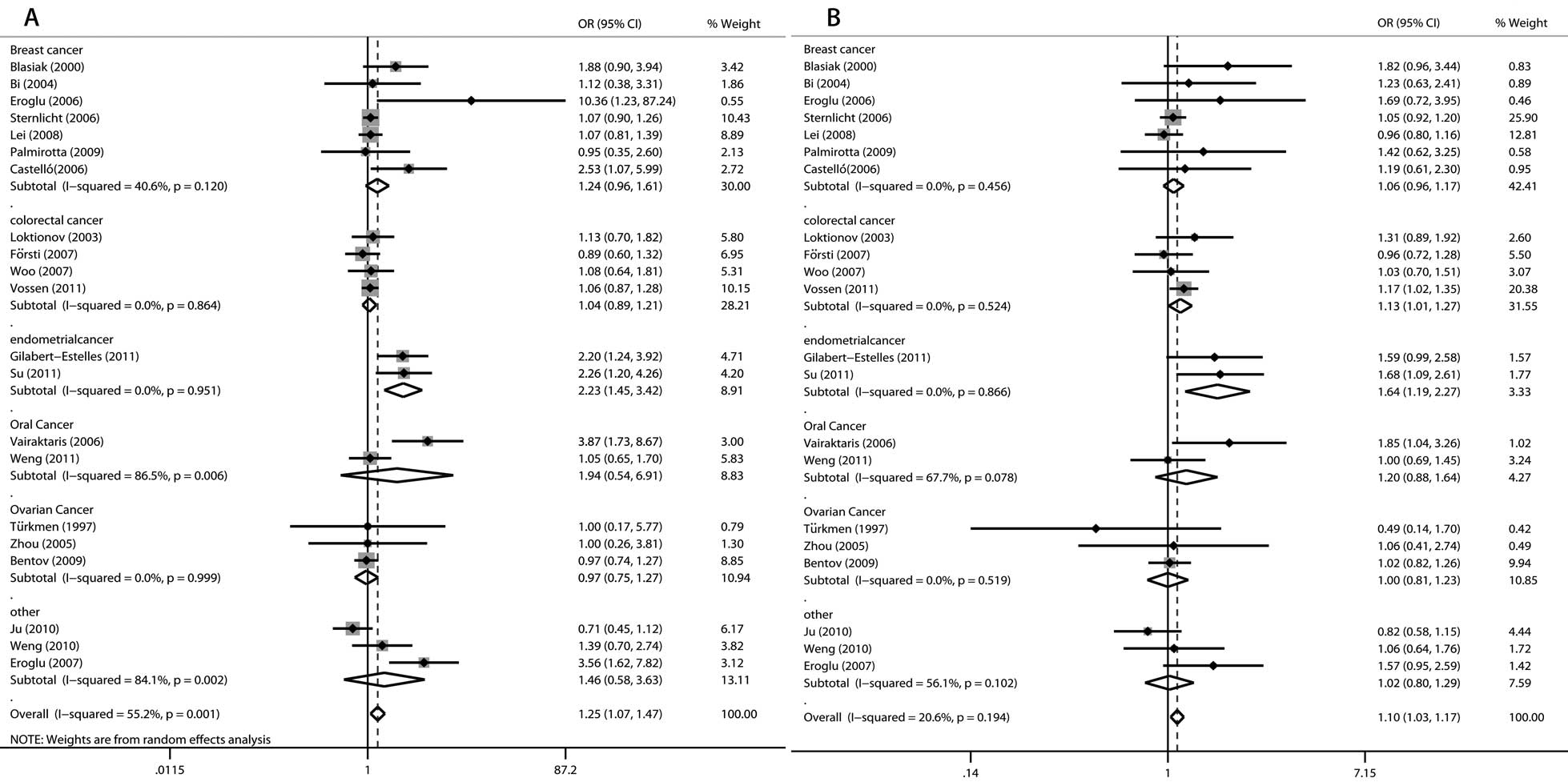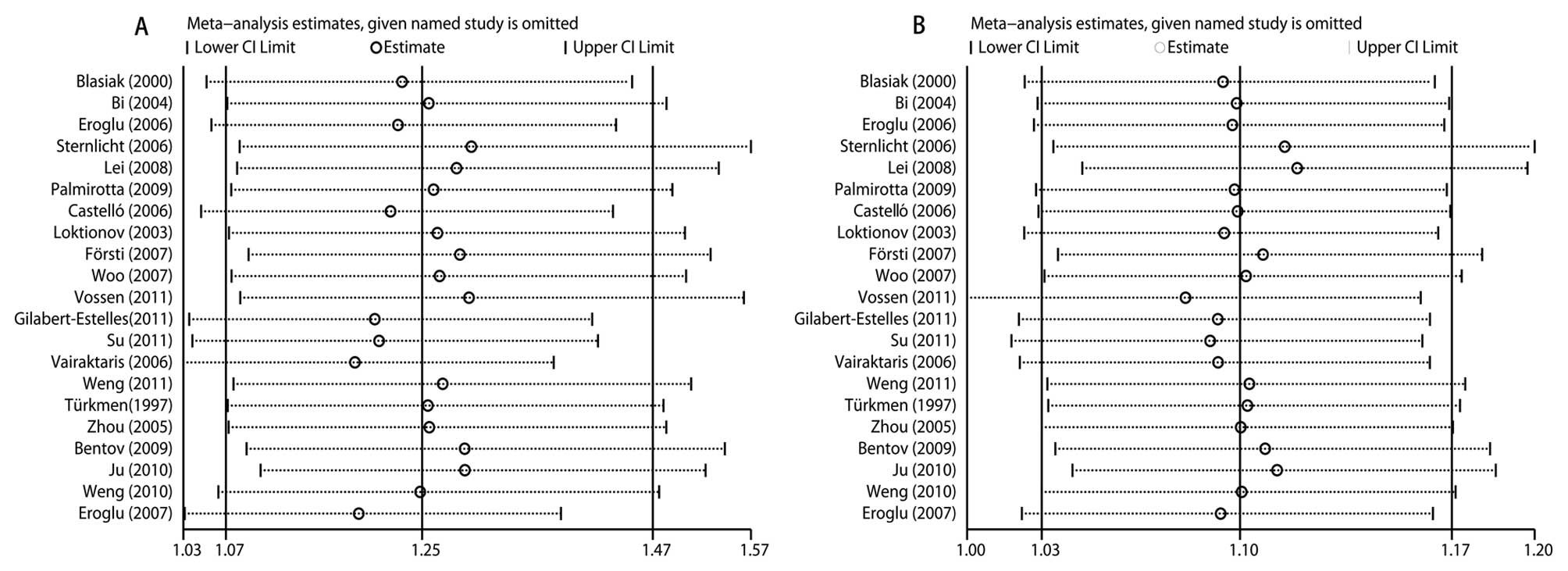|
1
|
Sleeman J and Steeg PS: Cancer metastasis
as a therapeutic target. Eur J Cancer. 46:1177–1180. 2010.
View Article : Google Scholar : PubMed/NCBI
|
|
2
|
Dellas C and Loskutoff DJ: Historical
analysis of PAI-1 from its discovery to its potential role in cell
motility and disease. Thromb Haemost. 93:631–640. 2005.PubMed/NCBI
|
|
3
|
Loktionov A, Watson MA, Stebbings WS,
Speakman CT and Bingham SA: Plasminogen activator inhibitor-1 gene
polymorphism and colorectal cancer risk and prognosis. Cancer Lett.
189:189–196. 2003. View Article : Google Scholar : PubMed/NCBI
|
|
4
|
Harbeck N, Kates RE, Look MP, et al:
Enhanced benefit from adjuvant chemotherapy in breast cancer
patients classified high-risk according to urokinase-type
plasminogen activator (uPA) and plasminogen activator inhibitor
type 1 (n = 3424). Cancer Res. 62:4617–4622. 2002.PubMed/NCBI
|
|
5
|
Pappot H, Pedersen AN, Brunner N and
Christensen IJ: The complex between urokinase (uPA) and its type-1
inhibitor (PAI-1) in pulmonary adenocarcinoma: relation to
prognosis. Lung Cancer. 51:193–200. 2006. View Article : Google Scholar
|
|
6
|
Sakakibara T, Hibi K, Koike M, et al:
Plasminogen activator inhibitor-1 as a potential marker for the
malignancy of gastric cancer. Cancer Sci. 97:395–399. 2006.
View Article : Google Scholar : PubMed/NCBI
|
|
7
|
Schmitt M, Mengele K, Napieralski R, et
al: Clinical utility of level-of-evidence-1 disease forecast cancer
biomarkers uPA and its inhibitor PAI-1. Expert Rev Mol Diagn.
10:1051–1067. 2010. View Article : Google Scholar : PubMed/NCBI
|
|
8
|
Ny T, Sawdey M, Lawrence D, Millan JL and
Loskutoff DJ: Cloning and sequence of a cDNA coding for the human
beta-migrating endothelial-cell-type plasminogen activator
inhibitor. Proc Natl Acad Sci USA. 83:6776–6780. 1986. View Article : Google Scholar : PubMed/NCBI
|
|
9
|
Kohler HP and Grant PJ:
Plasminogen-activator inhibitor type 1 and coronary artery disease.
N Engl J Med. 342:1792–1801. 2000. View Article : Google Scholar : PubMed/NCBI
|
|
10
|
Anvari A, Schuster E, Gottsauner-Wolf M,
Wojta J and Huber K: PAI-I 4G/5G polymorphism and sudden cardiac
death in patients with coronary artery disease. Thromb Res.
103:103–107. 2001. View Article : Google Scholar : PubMed/NCBI
|
|
11
|
Grancha S, Estelles A, Tormo G, et al:
Plasminogen activator inhibitor-1 (PAI-1) promoter 4G/5G genotype
and increased PAI-1 circulating levels in postmenopausal women with
coronary artery disease. Thromb Haemost. 81:516–521.
1999.PubMed/NCBI
|
|
12
|
Blasiak J and Smolarz B: Plasminogen
activator inhibitor-1 (PAI-1) gene 4G/5G promoter polymorphism is
not associated with breast cancer. Acta Biochim Pol. 47:191–199.
2000.PubMed/NCBI
|
|
13
|
Castelló R, España F, Vázquez C, et al:
Plasminogen activator inhibitor-1 4G/5G polymorphism in breast
cancer patients and its association with tissue PAI-1 levels and
tumor severity. Thromb Res. 117:487–492. 2006.PubMed/NCBI
|
|
14
|
Eroglu A, Ulu A, Cam R and Akar N:
Plasminogen activator inhibitor -1 gene 4G/5G polymorphism in
patients with breast cancer. J BUON. 11:481–484. 2006.PubMed/NCBI
|
|
15
|
Sternlicht MD, Dunning AM, Moore DH, et
al: Prognostic value of PAI1 in invasive breast cancer: evidence
that tumor-specific factors are more important than genetic
variation in regulating PAI1 expression. Cancer Epidemiol
Biomarkers Prev. 15:2107–2114. 2006. View Article : Google Scholar
|
|
16
|
Lei H, Hemminki K, Johansson R, et al:
PAI-1-675 4G/5G polymorphism as a prognostic biomarker in breast
cancer. Breast Cancer Res Treat. 109:165–175. 2008. View Article : Google Scholar : PubMed/NCBI
|
|
17
|
Palmirotta R, Ferroni P, Savonarola A, et
al: Prognostic value of pre-surgical plasma PAI-1 (plasminogen
activator inhibitor-1) levels in breast cancer. Thromb Res.
124:403–408. 2009. View Article : Google Scholar : PubMed/NCBI
|
|
18
|
Försti A, Lei H, Tavelin B, et al:
Polymorphisms in the genes of the urokinase plasminogen activation
system in relation to colorectal cancer. Ann Oncol. 18:1990–1994.
2007.PubMed/NCBI
|
|
19
|
Woo M, Park K, Nam J and Kim JC: Clinical
implications of matrix metalloproteinase-1, -3, -7, -9, -12, and
plasminogen activator inhibitor-1 gene polymorphisms in colorectal
cancer. J Gastroenterol Hepatol. 22:1064–1070. 2007. View Article : Google Scholar : PubMed/NCBI
|
|
20
|
Vossen CY, Hoffmeister M, Chang-Claude JC,
Rosendaal FR and Brenner H: Clotting factor gene polymorphisms and
colorectal cancer risk. J Clin Oncol. 29:1722–1727. 2011.
View Article : Google Scholar : PubMed/NCBI
|
|
21
|
Türkmen B, Schmitt M, Schmalfeldt B, et
al: Mutational analysis of the genes encoding urokinase-type
plasminogen activator (uPA) and its inhibitor PAI-1 in advanced
ovarian cancer. Electrophoresis. 18:686–689. 1997.PubMed/NCBI
|
|
22
|
Bentov Y, Brown TJ, Akbari MR, et al:
Polymorphic variation of genes in the fibrinolytic system and the
risk of ovarian cancer. PLoS One. 4:e59182009. View Article : Google Scholar : PubMed/NCBI
|
|
23
|
Vairaktaris E, Yapijakis C, Serefoglou Z,
et al: Plasminogen activator inhibitor-1 polymorphism is associated
with increased risk for oral cancer. Oral Oncol. 42:888–892. 2006.
View Article : Google Scholar : PubMed/NCBI
|
|
24
|
Weng CJ, Lin CW, Chung TT, Tsai CM, Chen
MK and Yang SF: Impact of uPA system gene polymorphisms on the
susceptibility of environmental factors to carcinogenesis and the
development of clinicopathology of oral cancer. Ann Surg Oncol.
18:805–812. 2011. View Article : Google Scholar : PubMed/NCBI
|
|
25
|
Gilabert-Estelles J, Ramon LA, Braza-Boils
A, et al: Plasminogen activator inhibitor-1 (PAI-1) 4 G/5 G
polymorphism and endometrial cancer. Influence of PAI-1
polymorphism on tissue PAI-1 antigen and mRNA expression and tumor
severity. Thromb Res. 130:242–247. 2011. View Article : Google Scholar : PubMed/NCBI
|
|
26
|
Su CK, Yeh KT, Yeh CB, et al: Genetic
polymorphism of the plasminogen activator inhibitor-1 is associated
with an increased risk of endometrial cancer. J Surg Oncol.
104:755–759. 2011. View Article : Google Scholar : PubMed/NCBI
|
|
27
|
Ju H, Lim B, Kim M, et al: SERPINE1 intron
polymorphisms affecting gene expression are associated with
diffuse-type gastric cancer susceptibility. Cancer. 116:4248–4255.
2010. View Article : Google Scholar : PubMed/NCBI
|
|
28
|
Weng CJ, Tsai CM, Chen YC, et al:
Evaluation of the association of urokinase plasminogen activator
system gene polymorphisms with susceptibility and pathological
development of hepatocellular carcinoma. Ann Surg Oncol.
17:3394–3401. 2010. View Article : Google Scholar : PubMed/NCBI
|
|
29
|
Wells GA, Shea B, O’Connell D, et al: The
Newcastle-Ottawa Scale (NOS) for assessing the quality of
nonrandomised studies in meta-analyses. Ottawa Health Research
Institute. http://www.ohri.ca/programs/clinical_epidemiology/oxford.aspuri.
2011, Accessed March 14, 2012.
|
|
30
|
DerSimonian R and Laird N: Meta-analysis
in clinical trials. Control Clin Trials. 7:177–188. 1986.
View Article : Google Scholar : PubMed/NCBI
|
|
31
|
Mantel N and Haenszel W: Statistical
aspects of the analysis of data from retrospective studies of
disease. J Natl Cancer Inst. 22:719–748. 1959.PubMed/NCBI
|
|
32
|
Egger M, Davey Smith G, Schneider M and
Minder C: Bias in meta-analysis detected by a simple, graphical
test. BMJ. 315:629–634. 1997. View Article : Google Scholar : PubMed/NCBI
|
|
33
|
Eroglu A, Ulu A, Cam R and Akar N:
Plasminogen activator inhibitor-1 gene 4G/5G polymorphism in cancer
patients. J BUON. 12:135–136. 2007.PubMed/NCBI
|
|
34
|
Zhou X and Xia SH: The study of the PAI-1
activity and its promoter region polymorphism in ovarian cancer.
Guizhou Medical Journal. 29:1072–1075. 2005.
|
|
35
|
Bi YT, Zheng M and Liang WD: The
correlation between 4G/5G polymorphism located in the promoter
region of PAI-I gene and breast cancer. Chinese Journal of Birth
Health & Heredity. 12:26–27. 2004.
|
|
36
|
Eriksson P, Kallin B, van ‘t Hooft FM,
Bavenholm P and Hamsten A: Allele-specific increase in basal
transcription of the plasminogen-activator inhibitor 1 gene is
associated with myocardial infarction. Proc Natl Acad Sci USA.
92:1851–1855. 1995. View Article : Google Scholar : PubMed/NCBI
|
|
37
|
Ohba K, Miyata Y, Kanda S, Koga S, Hayashi
T and Kanetake H: Expression of urokinase-type plasminogen
activator, urokinase-type plasminogen activator receptor and
plasminogen activator inhibitors in patients with renal cell
carcinoma: correlation with tumor associated macrophage and
prognosis. J Urol. 174:461–465. 2005. View Article : Google Scholar
|
|
38
|
Swiatkowska M, Szemraj J and Cierniewski
CS: Induction of PAI-1 expression by tumor necrosis factor alpha in
endothelial cells is mediated by its responsive element located in
the 4G/5G site. FEBS J. 272:5821–5831. 2005. View Article : Google Scholar : PubMed/NCBI
|
|
39
|
Chen YQ, Sloan-Lancaster J, Berg DT,
Richardson MA, Grinnell B and Tseng-Crank J: Differential
mechanisms of plasminogen activator inhibitor-1 gene activation by
transforming growth factor-beta and tumor necrosis factor-alpha in
endothelial cells. Thromb Haemost. 86:1563–1572. 2001.
|

















